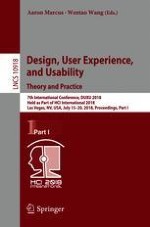2018 | OriginalPaper | Buchkapitel
The MeCUE Questionnaire (2.0): Meeting Five Basic Requirements for Lean and Standardized UX Assessment
verfasst von : Michael Minge, Manfred Thüring
Erschienen in: Design, User Experience, and Usability: Theory and Practice
Aktivieren Sie unsere intelligente Suche, um passende Fachinhalte oder Patente zu finden.
Wählen Sie Textabschnitte aus um mit Künstlicher Intelligenz passenden Patente zu finden. powered by
Markieren Sie Textabschnitte, um KI-gestützt weitere passende Inhalte zu finden. powered by
